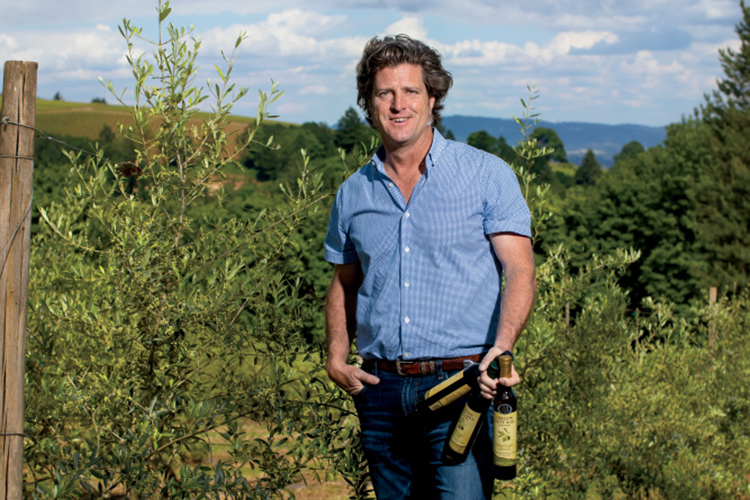Home > Oregon > Oregon Farm to Table > How Oregon Olive Mill Beats the Odds Producing Quality Olive Oil
How Oregon Olive Mill Beats the Odds Producing Quality Olive Oil

Oregon farmers grow crops ranging from the common place to the unusual. Wheat and corn grown in Oregon, of course, is similar to what’s grown over much of the world.
But the state also grows 99 percent of U.S. hazelnuts and produces two-thirds of America’s cool-weather grass seed and carrot seed. Dozens of other specialty or niche crops fall in between.
Olive Oil – Really
Oregon isn’t the Mediterranean, or even California. To which Paul Durant might justifiably answer, “No kidding.”
“There have been a ton of setbacks on the agronomy side, a huge number,” says Durant, the emergent honcho at his family’s Red Ridge Farms, home to the Oregon Olive Mill and Durant Vineyards.
Durant says he’s replanted olive trees every year for the last ten, experimenting with varieties that can best handle the Willamette Valley’s extended wet, cool periods. He’s pulled trees out of challenging areas, reducing the orchard from about 17 acres to 15. He’s accepted the reality that the orchard doesn’t yet yield enough to produce 100 percent estate olive oil, and he needs to buy olives from other growers. And yet…
“I’m really excited, the orchard has never looked so good,” Durant says. He believes he’s dialed in on applications of micronutrients such as boron, potassium, zinc and calcium. Putting heat-retention fabric around trees at ground level is paying off as well.
“Olive trees eat the heat, they love it,” he says.
Yields improve every year. Oregon Olive Mill was the first to provide olive crushing in Oregon, using an Italian press, and last year Durant crushed olives for eight other growers. The amounts they brought to the mill in Dayton ranged from 300 pounds to 11 tons. Meanwhile, the farm’s on-site and online retail sales of oil and wine diversify the operation, and an olive tree propagation nursery does the same.
Durant, 51, is a mechanical engineer who in 2010 returned, as he’d long planned, to the family farm. He credits his parents, Penny and Ken Durant, with the decision to grow olives and install an oil-pressing mill as part of the farm’s pursuit of a value-added business model. The family believes high-quality olive oil complements their well-regarded wine, but will it work?
Bogdan Caceu, executive director of the Olive Growers of Oregon and owner of La Creole Orchards south of Red Ridge, acknowledges the industry is “miniscule” for now, with less than 100 acres of olives statewide. But he said two groups plan to plant olive orchards of 200 acres or more, using high- density plantings of about 1,000 trees per acre. A second oil mill is in the works, he says.

Compared to California, Oregon orchards produce less fruit per acre and less oil per ton of olives. On the other hand, Oregon’s orchards have trees more than 17 years old now and have shown they can hang tough in the state’s cooler climate. “The trees themselves have made it,” Caceu says.
Better still, “The proof is in the olive oil,” he says. “The quality of oil has been fantastic.”
The demand for high-quality extra-virgin olive oil is strong, Caceu says. Oil makers are dealing with consumers who favor local products and who are “well-informed in the culinary arts and will appreciate the sensory aspect” of olive oil.
Caceu applauds Oregon State University’s decision to research olive tree cultivars. He and other backers believe olive oil could repeat the story of Oregon wine, in which a small group of collaborative hard-chargers turned the state’s wine into a global brand, especially Pinot noir. In that example, Oregon’s pioneer vintners knew they couldn’t compete with California’s quantity, so decided to focus on quality.
The search is on, Caceu says, for a cultivar that is cold hardy, precocious in the amount of fruit and oil it produces, and has exceptional sensory quality.
Caceu believes, “If we check all those boxes, that’s the Pinot noir of olives.”



